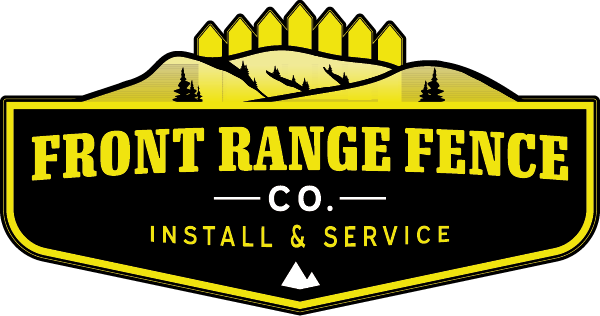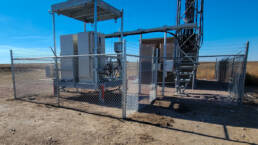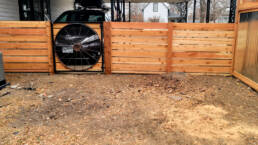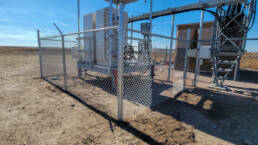When it comes to securing your business premises, a well-chosen commercial fence is more than just a physical barrier—it’s a crucial element of your overall security strategy and a key contributor to your company’s professional image. Whether you’re safeguarding valuable assets, protecting sensitive areas, or simply defining your property boundaries, the right fence can make a significant difference in both safety and aesthetics.
In Denver, where businesses range from bustling urban storefronts to expansive industrial complexes, selecting the appropriate commercial fence requires careful consideration of various factors, from security needs to local regulations. At Front Range Fence, we understand the unique challenges Denver business owners face, and we’re here to guide you through the process of making the best choice for your commercial fencing needs.
Assessing Your Needs
Before diving into the various types of commercial fencing options, it’s essential to start with a clear understanding of your specific needs. Every business is different, and what works for one might not be suitable for another. By thoroughly assessing your requirements, you’ll be better equipped to choose a fence that not only meets your security and aesthetic goals but also aligns with regulatory standards and budgetary constraints.
Property Security Requirements
The primary purpose of any commercial fence is security. However, the level of security required can vary greatly depending on the nature of your business. For instance, a retail store might only need a basic fence to deter casual intruders, while a warehouse storing high-value inventory might require a more robust solution with additional security features.
Consider the following when assessing your security needs:
- Type of Assets: What are you protecting? Equipment, inventory, and even personnel can influence the level of security you need. High-value or sensitive assets might necessitate features like barbed wire, electric fencing, or enhanced surveillance integration.
- Access Points: Identify where access is allowed and where it needs to be restricted. This includes not only vehicle and pedestrian entrances but also potential vulnerabilities like rear alleys or side gates.
- Security Level: Determine whether you need a basic deterrent (e.g., a standard chain-link fence) or a high-security fence designed to withstand more determined attempts at intrusion.
Regulatory and Compliance Considerations
In Denver, as in many other locations, there are specific regulations governing commercial fencing. These can include height restrictions, material requirements, and even aesthetic guidelines, especially if your property is located in a historic district or near residential areas.
Key regulatory considerations include:
- Zoning Laws: Local zoning regulations may dictate the types of fences allowed in your area. For example, there might be restrictions on the height of fences along property lines or in front of buildings.
- Building Codes: Some building codes may require certain safety features, such as specific gate designs or the inclusion of emergency exits in fence layouts.
- Permits and Approvals: Depending on the complexity of the project, you may need to obtain permits before installation. Working with an experienced fence contractor like Front Range Fence ensures that your project complies with all necessary regulations, avoiding potential fines or delays.
By carefully evaluating your security needs and understanding the regulatory landscape, you can begin the process of selecting a commercial fence that not only protects your business but also meets all legal requirements.
Types of Commercial Fencing Options
Once you’ve assessed your needs, the next step is to explore the different types of commercial fencing options available. Each type of fence offers unique benefits, and the best choice for your business will depend on a combination of security requirements, aesthetic preferences, and budget considerations. Below are some of the most popular commercial fencing options used by businesses in the Denver area.
Chain Link Fences
Chain link fences are a common choice for many businesses due to their durability, cost-effectiveness, and versatility. These fences provide a practical solution for businesses that need a basic level of security without compromising on visibility.
- Durability: Chain link fences are made from galvanized steel, which is resistant to rust and corrosion. This makes them a long-lasting option, even in Denver’s variable weather conditions.
- Maintenance Considerations: Minimal maintenance is required beyond occasional inspections for damage or wear. Repairs are typically straightforward and inexpensive.
- Customization Options: Chain link fences can be customized in terms of height, gauge (thickness of the wire), and coating (e.g., vinyl coating for added protection and aesthetics). Additionally, privacy slats can be added to increase security and reduce visibility into the property.
Ornamental Metal Fences
For businesses that prioritize both security and visual appeal, ornamental metal fences are an excellent choice. These fences are often made from wrought iron, steel, or aluminum, offering a high level of protection while enhancing the overall look of the property.
- Aesthetic Appeal: Ornamental metal fences come in a wide variety of designs, from classic to contemporary, allowing you to match the fence with your business’s architectural style. These fences can also be powder-coated in various colors to complement your brand’s identity.
- Customization: In addition to aesthetic choices, ornamental metal fences can be tailored with additional security features such as pointed finials or spiked tops to deter climbing.
- Maintenance Requirements: While ornamental fences are durable, they do require periodic maintenance to prevent rust and maintain their appearance. Regular painting or coating touch-ups can help extend the life of the fence.
Vinyl and PVC Fences
Vinyl and PVC fences offer a low-maintenance alternative to traditional wood or metal fences. These fences are ideal for businesses that want a clean, professional look with minimal upkeep.
- Low Maintenance: One of the biggest advantages of vinyl and PVC fences is that they require virtually no maintenance. Unlike wood, they won’t rot, warp, or need painting. A simple wash with soap and water is usually sufficient to keep them looking new.
- Design Flexibility: Vinyl and PVC fences come in a wide range of styles, colors, and textures, allowing you to create a look that aligns with your business’s image. Whether you prefer the appearance of wood, stone, or a modern finish, there are options available to suit your taste.
- Durability: These fences are designed to withstand harsh weather conditions, making them a great choice for Denver’s climate. They are resistant to fading, cracking, and other forms of damage caused by UV exposure or moisture.
Factors Influencing Your Choice
Choosing the right commercial fence involves more than just selecting a type of material. Several factors can influence your decision, including budget, environmental conditions, and long-term maintenance requirements. Understanding these factors will help you make an informed choice that meets your business’s needs both now and in the future.
Budget Constraints
Budget is often one of the most significant considerations when selecting a commercial fence. While it’s essential to invest in a quality fence that offers the security and durability your business needs, it’s equally important to stay within your financial limits.
- Initial Costs vs. Long-Term Expenses: The upfront cost of installing a fence is just one part of the equation. Consider the long-term maintenance costs as well. For example, while chain link fences might have a lower initial cost, ornamental metal fences could offer better value over time due to their durability and lower maintenance needs.
- Return on Investment (ROI): Think about how the fence will contribute to your business’s overall value. A well-chosen fence can enhance the property’s curb appeal, potentially increasing its market value and making a positive impression on clients and customers. Additionally, investing in a higher-quality fence might save money in the long run by reducing repair and replacement costs.
Environmental Factors
The environment where your business is located plays a crucial role in determining the best type of fence. Denver’s climate, with its cold winters, hot summers, and occasional severe weather, can impact the performance and longevity of different fencing materials.
- Climate Considerations: Some materials are better suited to withstand Denver’s weather extremes. For instance, vinyl and PVC fences are resistant to moisture and UV rays, making them ideal for areas with high sun exposure. On the other hand, metal fences, particularly those treated with rust-resistant coatings, can endure snow and ice better than untreated wood.
- Sustainability Options: If environmental impact is a concern for your business, consider choosing sustainable fencing options. Many manufacturers offer eco-friendly materials, such as recycled metal or composite materials that reduce the need for virgin resources. Additionally, some coatings and treatments are designed to be more environmentally friendly, offering protection without harmful chemicals.
Customization and Design
While functionality is a primary concern when choosing a commercial fence, aesthetics and customization are equally important, especially for businesses that want to create a strong visual identity. A well-designed fence can enhance your property’s appearance, reinforce your brand, and provide additional features tailored to your specific needs.
Matching Fence Design to Business Image
The design of your fence should align with your business’s image and branding. Whether your goal is to project an air of professionalism, create a welcoming environment, or establish a secure and authoritative presence, the right fence can help you achieve that.
- Branding and Visual Appeal: Consider how the fence design can reflect your brand’s identity. For example, a sleek, modern metal fence might be ideal for a tech company, while a more traditional wrought iron design could suit a law firm or historic property. You can also explore options like custom colors, decorative elements, or integrating your business logo into the fence design to create a cohesive and professional look.
- Incorporating Business Colors and Logos: Customization options such as powder-coating metal fences in your brand’s colors or adding ornamental elements that echo your logo can make a significant impact. These small details can help reinforce your brand every time a client or customer visits your property.
Additional Features and Accessories
Beyond the basic structure of the fence, there are numerous additional features and accessories that can enhance both the functionality and appearance of your commercial fence.
- Security Enhancements: For businesses that require a higher level of security, consider adding features like barbed wire, razor wire, or even electric fencing. These enhancements can act as a strong deterrent against unauthorized access while integrating seamlessly with the overall fence design.
- Gates and Access Control: The entry points to your property are just as important as the fence itself. Custom gates can be designed to match the fence, providing both security and aesthetic continuity. Additionally, you can incorporate access control systems such as keypads, card readers, or remote-controlled gates to ensure that only authorized personnel can enter the premises.
- Privacy Features: If your business requires privacy, options like adding privacy slats to a chain link fence or using solid panel designs in vinyl or wood can shield your property from prying eyes. These features are particularly useful for businesses that need to protect sensitive areas or maintain client confidentiality.
Installation and Maintenance
After selecting the right commercial fence, the next critical steps are ensuring proper installation and setting up a maintenance plan. A well-installed fence will provide the security and aesthetic appeal your business needs, while regular maintenance will extend its life and keep it looking and functioning at its best.
Choosing a Reliable Fence Contractor
The quality of your fence installation is just as important as the materials you choose. Even the best fence can fail to provide the expected security and durability if it’s not installed correctly. Therefore, choosing an experienced and reputable fence contractor is essential.
- Experience with Commercial Projects: Commercial fencing projects often have unique challenges that differ from residential installations, such as larger scale, specific security requirements, and adherence to stricter regulations. Ensure that the contractor you choose has substantial experience with commercial installations and understands the particular needs of businesses.
- Reviews and References: Before committing to a contractor, take the time to read reviews and ask for references from past clients. A contractor with a strong track record of successful commercial installations will be able to provide references and showcase examples of previous work.
- Compliance with Local Regulations: A knowledgeable contractor will ensure that your fence installation complies with all local building codes and zoning laws, helping you avoid potential legal issues or fines. At Front Range Fence, we handle all aspects of compliance, from permits to final inspections, so you can focus on running your business.
Maintenance Tips for Longevity
Even the most durable fences require regular maintenance to remain in optimal condition. A proactive maintenance plan can prevent minor issues from turning into costly repairs and extend the life of your fence.
- Regular Inspections: Schedule regular inspections of your fence to check for signs of wear, damage, or potential security vulnerabilities. Look for issues such as rust, loose fittings, broken panels, or damage from weather or accidents. Early detection of problems allows for timely repairs, preventing more extensive damage.
- Seasonal Maintenance: Denver’s climate can be harsh, with extreme temperature changes, snow, and ice. Adjust your maintenance routine according to the season. For example, in winter, clear snow and ice buildup to prevent rust or damage to the fence, and in spring, check for any issues that might have arisen from the harsh winter conditions.
- Repairs and Replacements: Address any damage immediately to maintain the integrity and appearance of your fence. Whether it’s a section of chain link that needs tightening, a gate that requires realignment, or a rust spot that needs treatment, prompt repairs will keep your fence functioning effectively and looking professional.
- Professional Maintenance Services: Consider engaging a professional maintenance service for more complex tasks or annual inspections. Front Range Fence offers maintenance packages designed to keep your commercial fence in top condition year-round.
Conclusion: Making an Informed Decision for Your Business
Selecting the right commercial fence is a crucial decision that impacts your business’s security, appearance, and overall functionality. By carefully assessing your needs, exploring various fencing options, considering key factors like budget and environmental conditions, and paying attention to customization, you can choose a fence that perfectly aligns with your business goals.
At Front Range Fence, we understand the unique challenges that Denver area businesses face, and we’re committed to helping you find the ideal fencing solution. From initial consultation to installation and maintenance, our team is here to provide expert guidance and top-notch service every step of the way. With the right commercial fence, you’ll not only enhance the security and value of your property but also create a lasting impression that reflects the professionalism and integrity of your business. Contact us today.

Contact us today to discuss your fencing needs and schedule an onsite estimate.
Let us help you create a secure, beautiful, and enduring fencing solution that complements your property and exceeds your expectations. Experience the difference of our top-notch fencing services and join our list of satisfied customers.
Like this article? Spread the word!
Related Posts
February 27, 2024
Boost Your Business’s Image: Installing a Stylish Commercial Fence with Front Range Fence in Denver
Transform your business's image with a stylish commercial fence from Front Range Fence. Elevate security, aesthetics,…
0 Comments12 Minutes
January 23, 2024
Boost Security and Enhance Your Business: Top 5 Benefits of Installing Commercial Fencing with Front Range Fence
Secure your Denver business with Front Range Fence – offering more than just security. Explore our top-notch commercial…
0 Comments18 Minutes
August 10, 2023
From Privacy to Protection: How Commercial Fencing Enhances Security
Secure your Denver, CO business with Front Range Fence's commercial fencing solutions. From robust perimeter protection…
0 Comments12 Minutes



